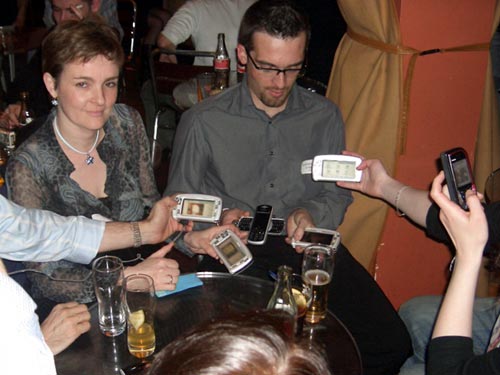Spurred by a
culture of popular expression and debate that can be traced back to France’s 17th-century salons, the French are embracing weblogs with a greater zeal than anyone on the European continent.
Take a recent Paris warehouse party, which hooked up 200 local bloggers in person for the first time, an illustration of the European web’s best-kept secret – when it comes to blogs, the French can’t get enough.

“The French have a long tradition of speaking loudly,” said Loc Le Meur, a Frenchman and Six Apart‘s European vice president. “We are the people who made the French Revolution, (the national uprising of) May ’68 — and just look at all our strikes! We always want to debate. Perhaps blogs are the ultimate tool for us to express ourselves.”
So, while leading politicians like ex-Prime Minister Alain Jupp keep high-profile weblogs, just as common are citizen agitators like Christophe Grbert, whose daily diatribes against the way local politicians run his home town of Puteaux are so relentless that the town’s mayor once had him arrested.
The phenomenon will be debated in France’s parliament on Monday during Les Blogs, a conference drawing over 200 international delegates. Expatriate bloguers will join the fray with a New York gathering in May.
According to statistics from the National Institute for Technology and Liberal Education, French is now the most common language in the blogosphere after English — and the craze is building, with a rash of regular blog soirees, the launch of several political weblogs and the emergence of more French bosses in CEO blogger circles.
“France is certainly taking a lead in the European market in a big way,” said Lee Bryant, a social-software consultant with London-based Headshift. “There is a sense of an opportunity that people must jump on.”
The French blogeur revolution is being spearheaded by precocious youngsters. According to government figures, half of all schoolchildren are bloggers, an estimated 3 million. Almost 2 million of them use Skyblog, a service operated by youth radio station Skyrock that is growing by around 600 new journals and 200,000 entries every day.

Hundreds of thousands of French youths use cell phones to post diary entries and photographs to their skyblogs.
The craze has led to legal action brought against several high school pupils for insulting teachers and for publishing unauthorized camphone snaps.
Photo: Courtesy of Benoit Dausse
Many teens use cell phones to post diary entries and pop-culture news flashes to their skyblogs on the move. But that portability is ruffling feathers in the classroom, where provocative adolescents use their journals to lampoon teachers and classmates with embarrassing camera-phone snaps and abusive remarks like “il pue le vin” — “he stinks of wine.”
A spate of blog-related suspensions culminated last month in the expulsion of 10 pupils from high schools in Auvergne and Picardy, four of whom also faced legal action; ministers swiftly introduced new school rules making it unlawful to insult anyone by blog.
“We discovered blogs in the U.S. in 2001 and wanted to adapt this formidable means of expression for our rising generation,” said Skyrock CEO Pierre Bellanger. “The classroom was formerly a closed place but, with mobile phones, it becomes a recordable, open place. The adults do not like it and are lost there.”
“The internet is the most important medium for school kids in France,” said Six Apart’s Le Meur. “The young people are not used yet to traditional media. They were already sharing everything on instant messaging, so blogs are just natural for them — the problem is, nobody told them they could not criticize their teachers.”
While bloggers elsewhere are commonly depicted warring with mainstream media, the rise of France’s blogeurs owes much to traditional publishers and broadcasters like VNU, 01net and Europe2, which have popularized the form with high-profile consumer blog services.
Le Monde, France’s biggest newspaper, is also a weblog host, letting thousands of readers write journals alongside those of staff reporters and columnists. Just two days after the invitation to “become your own editor” in December, readers-turned-writers were leapfrogging the pros in a rundown of the online paper’s most-read pages.
Favorite blogue topics du jour range from chic geek speak on the latest gadgets to African music and the imminent European constitution referendum.
Another blog is a holy grail for followers of faultless Franais: Le Monde editors spotlight imperfect uses of the language by their paper in a public journal, adding corrections so readers don’t commit the same faux pas as embarrassed reporters.
While internet penetration in France is below the European average, the country’s cherished ideals of libert, egalit and fraternit are a perfect fit for blogs.
A greater proportion of northern Europeans may be online, but they are commonly seen as less expressive than the French, with their readiness for vocal civic discourse. “(They have) nothing like the buzz being achieved in France,” Headshift’s Bryant said. “Organizations in the U.K. and elsewhere buy into the ideas, but are less keen to make the leap.”